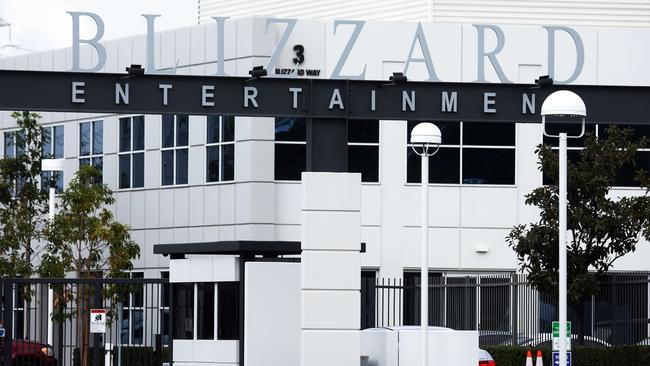Microsoft’s mammoth buyout of Activision Blizzard to impact gamers
News that Microsoft is buying embattled games developer Activision Blizzard has made waves in the video gaming community.

News that gaming behemoth Microsoft is buying embattled games developer Activision Blizzard for a monumental $US68.7bn has certainly made waves in the video gaming community, with many people wondering what the potential impact of such a sale could be.
The money, equivalent to $95.5bn locally, is just staggering. To attempt to put it in perspective, Microsoft is proposing to make a cash purchase equivalent to dollar value of the entire 2021 defence budget of the United Kingdom.
Activision Blizzard is the publisher of some enormously popular and profitable games, notably the Call of Duty first-person shooter franchise, the World of Warcraft massively multiplayer online role-playing game, and the enormously popular mobile game Candy Crush.
However, Activision Blizzard is currently embroiled in a sexual harassment and workplace culture lawsuit brought by the US state of California and the company has been copping flak from gamers and the industry alike over the issue.
It is also worth noting that the deal is still subject to shareholder, regulatory and antitrust approvals in the US, so it could be some time before it all goes through – assuming it clears the necessary hurdles.
Microsoft currently owns 23 studios, operating under the Xbox Game Studios umbrella, with those ranks bolstered by the acquisition of Bethesda last year for $US7.5bn ($10.4bn).
As a result, Microsoft have several of gaming’s biggest franchises under its belt, including Minecraft, Gears of War, Forza Motorsport, Doom, The Elder Scrolls and Fallout, in addition to its flagship Xbox console family.
Xbox head Phil Spencer has been widely – and rightly – praised for his “pro-gamer” stance on many issues, ranging from championing backwards compatibility and crossplay to ensuring games are accessible to as many people as possible – including having the Xbox team design a controller specifically for people with disabilities.
One of the most marked successes Xbox has enjoyed is Xbox Game Pass subscription service, which allows gamers to access hundreds of games from Microsoft and other studios for a monthly fee, currently $15.95 per month for Game Pass Ultimate in Australia.
The Activision Blizzard acquisition will add even more games to the service, although at this stage it’s not clear how that would work for titles such as World of Warcraft, which have a separate monthly fee attached to them.
It would also mean Microsoft owns a significant chunk of the AAA gaming studios out there, a fact which has been ringing some alarm bells in the wider industry. That doubtless includes rival Sony, who make the PlayStation console and have a very healthy stable of studios under its belt too.
The conventional wisdom in the gaming community is that, when comparing the two major console systems, Sony PlayStation has better ‘exclusives’ – games which aren’t available on other platforms.
Certainly, the list of critically acclaimed Sony exclusives is a long and impressive one, including titles such as the Uncharted series, Ghost of Tsushima, Ratchet & Clank, The Last Of Us and God of War – the latter of which recently received a PC release.
The overwhelming majority of AAA games are released on PC, Xbox and PlayStation, although not necessarily at the same time; Red Dead Redemption II did not get a PC release until more than a year after its console launch.
There’s been some initial concern from gamers that Xbox will suddenly turn its newly acquired AAA franchises into PC/Xbox exclusives, but the reality is that seems extraordinarily unlikely.
As an illustration: the Call of Duty franchise has sold more than 200 million copies across all platforms since the first game launched in 2003, and the 2019 mobile version, Call of Duty: Warlord has reportedly earned Activision Blizzard more than $US1bn since it launched in 2019. It would be a terrible business decision to leave a gigantic pile of money on the table in the name of some sort of gaming platform tribalism.
Further lending credence to this is the Xbox head himself saying on Twitter (January 21) that he had been in touch with senior people at Sony and reassured them that Xbox was not planning to pull a metaphorical rug out from underneath their fellow industry member.
“I confirmed our intent to honour all existing agreements upon acquisition of Activision Blizzard and our desire to keep Call of Duty on PlayStation. Sony is an important part of our industry, and we value our relationship,” he said.
There are legitimate concerns about publisher hegemony in the gaming world, and many entertainment fans and pop culture enthusiasts have reservations about Disney owning so many franchises.
In the case of Microsoft buying Activision Blizzard however, the benefits certainly seem to outweigh the disadvantages, at least at this point. Setting aside ‘behind the scenes’ benefits like changes to corporate culture and working environments, the acquisition will mean more games on Xbox Game Pass, which means more people playing those games.
Video games are expensive; a new-release AAA title typically costs between $79-$100 at launch, which is a lot of money even in first world places like Australia, the US and Western Europe. It’s almost completely unaffordable for someone in a lower-income region like Africa, India and Latin America; they simply cannot afford to spend a significant chunk of their entire monthly income on a single video game.
More games available via an affordable subscription service means more people globally can participate in the international gaming community, which has countless ancillary benefits including higher tech literacy, increased happiness, and even improved mental health outcomes.
The acquisition is not going to put Sony PlayStation out of business. Ubisoft and EA and Square Enix and the other AAA developers are not going to stop making games because Microsoft own even more big names, and gamers are not going to be short of games to play now or at any point in the foreseeable future.
Ultimately it’s going to be a while before the sale can be finalised, and we’re going to see a lot of speculation, internet arguing, and amusing memes in the meantime. Even if the deal does go through without any hitches, it could be a while before the full impacts on the industry and gaming as a whole become apparent.


